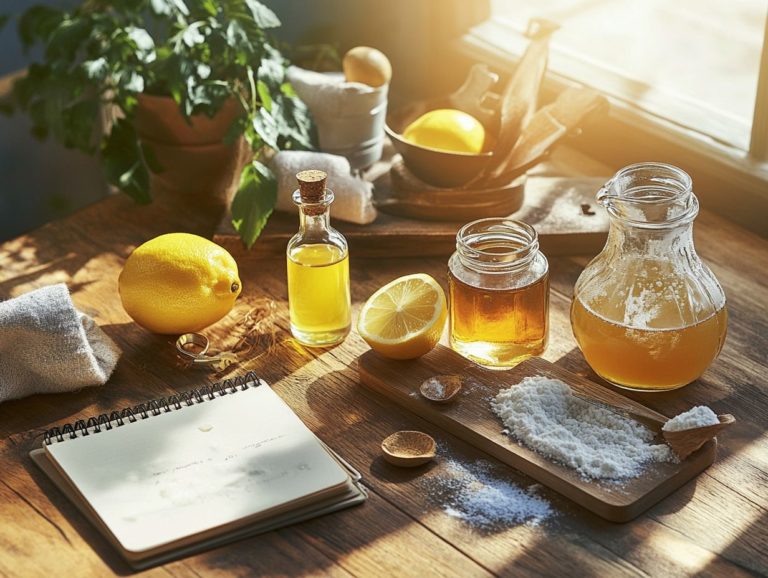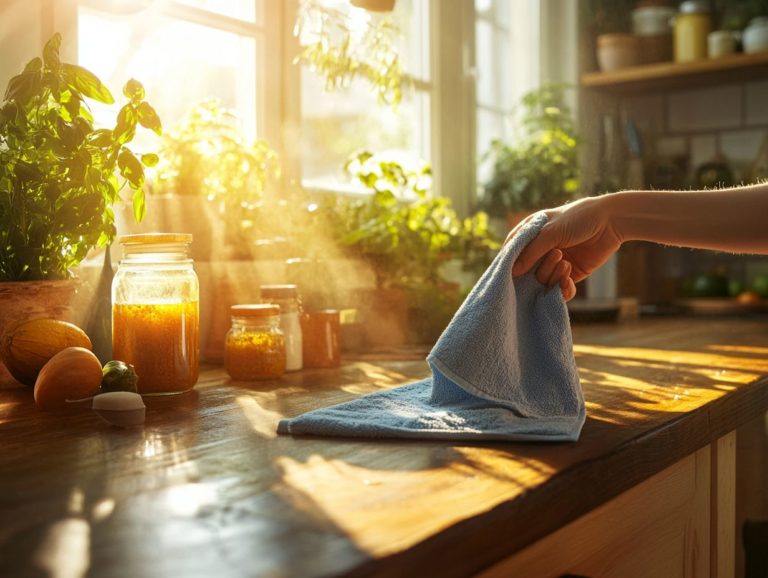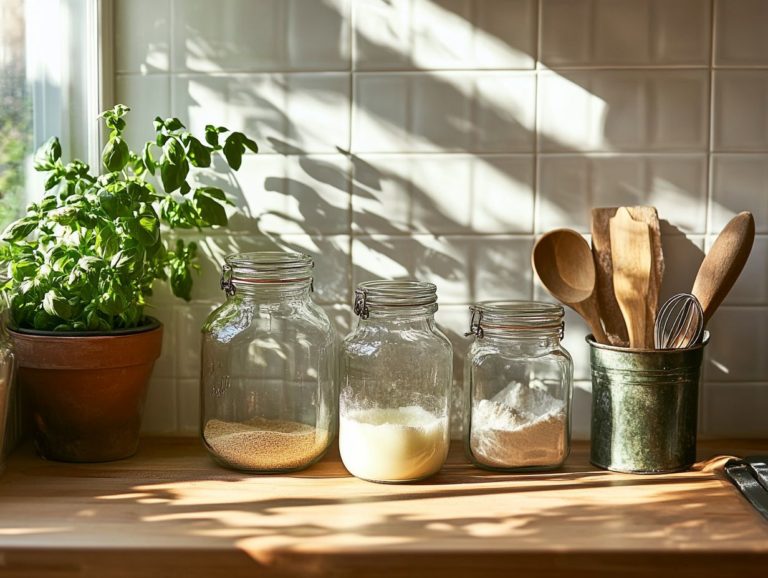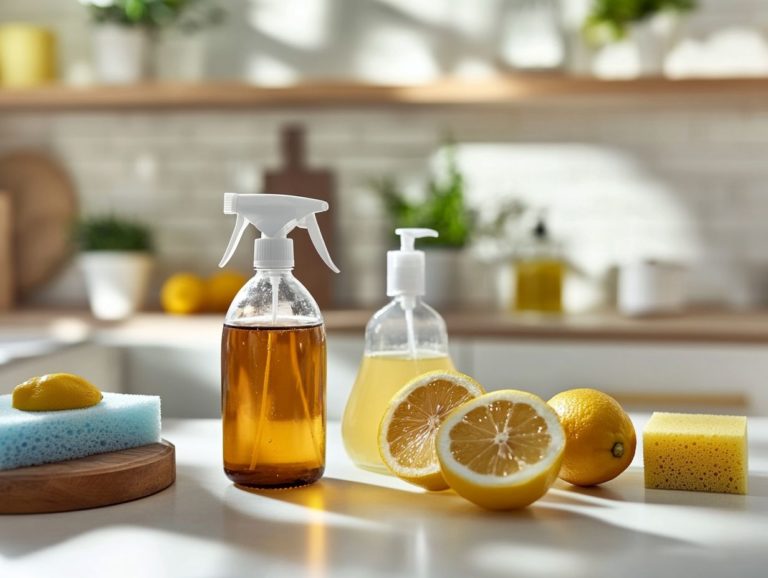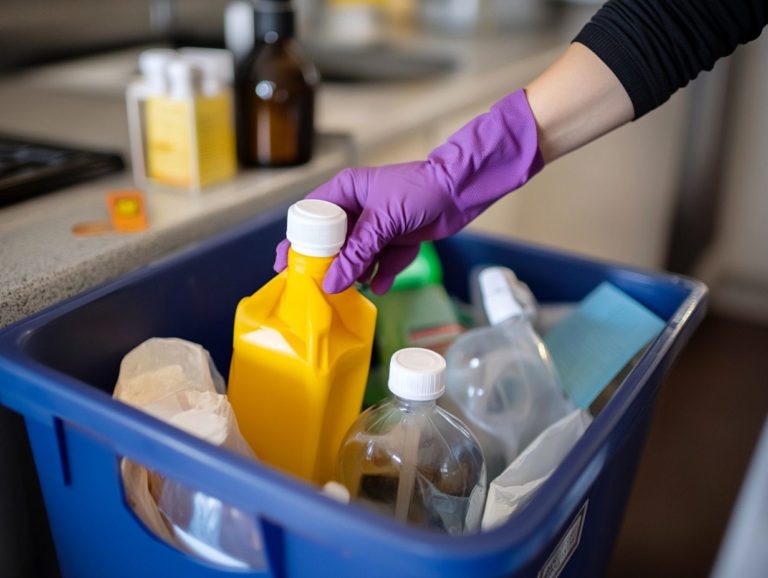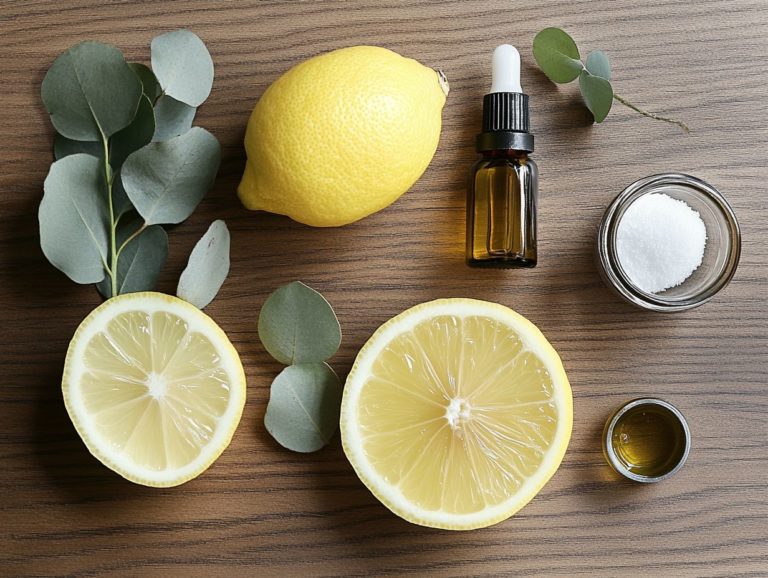How to Tackle Grease with Natural Ingredients?
Ready to tackle that stubborn grease? Let s dive into natural cleaning solutions that work wonders! Handling stubborn grease may seem like an uphill battle, but nature provides remarkable solutions that are just a step away in your kitchen. Whether it’s using a homemade degreaser or natural cleaning methods, you have all the tools you need.
By harnessing the power of natural ingredients such as lemon juice, vinegar, baking soda, and even a gentle, plant-based soap, you can effortlessly conquer grease. You’ll discover practical recipes for sprays, scrubs, and pastes that use these effective components, along with insightful maintenance tips to achieve that immaculate finish.
Embrace the transition from harsh chemicals to a cleaner, greener home, and revel in the satisfaction of a job well done. Your kitchen surfaces will thank you.
Contents
Key Takeaways:
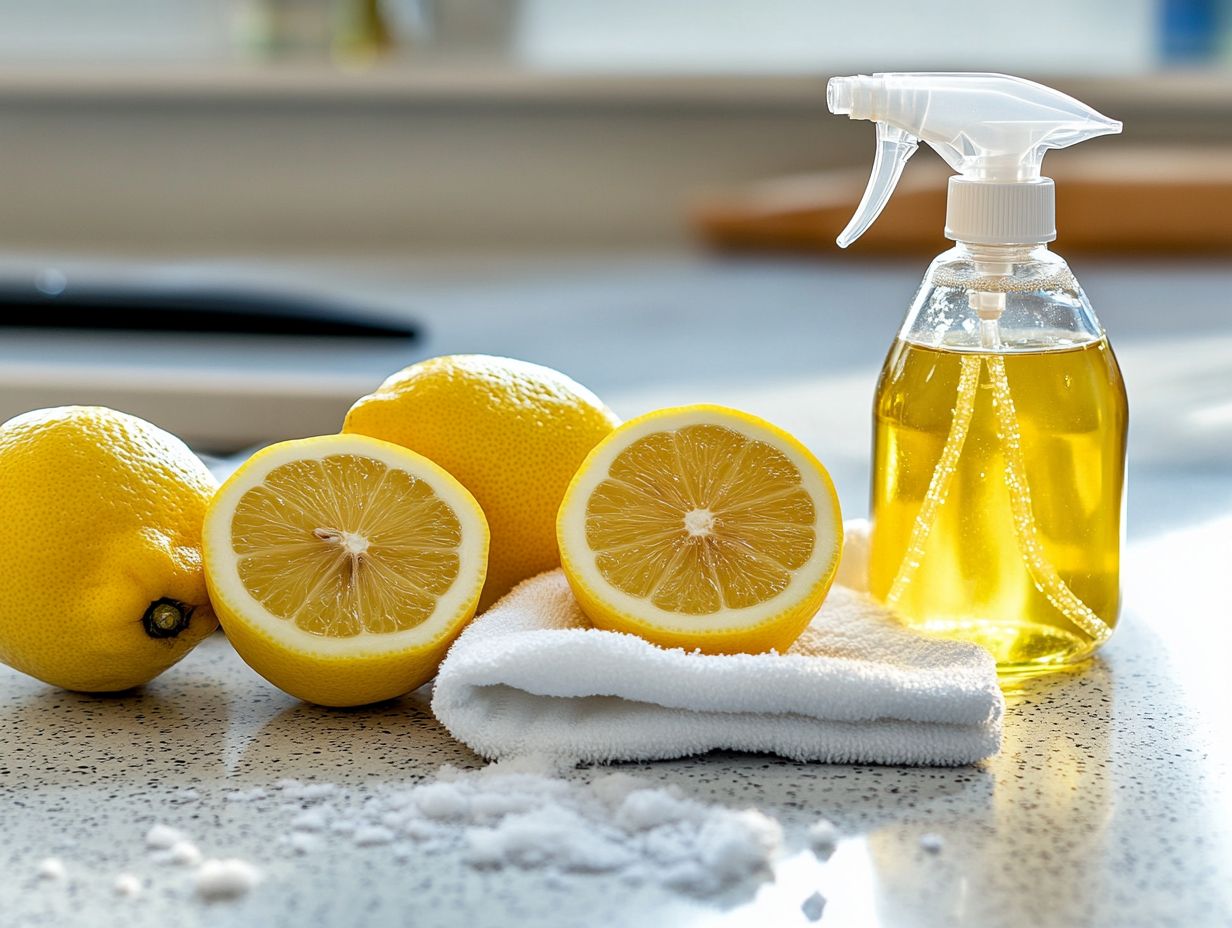
- Use natural ingredients like lemon juice, vinegar, baking soda, salt, cornstarch, dish soap, and even essential oils to tackle grease.
- Create effective cleaning solutions using combinations of these ingredients, such as a lemon juice and vinegar spray, a baking soda and salt scrub, or a cornstarch and dish soap paste. Consider adding essential oils for added antibacterial benefits and a pleasant fragrance.
- Additional tips for tackling grease include using hot water, a scrub brush, wearing cleaning gloves, letting the solution sit before wiping, and rinsing with cold water.
What Natural Ingredients Can Be Used To Tackle Grease?
In your pursuit of a pristine kitchen free from pesky grease buildup, consider embracing natural ingredients as your go-to alternatives to those commercial cleaners laden with harmful chemicals.
By utilizing the strength of lemon juice, vinegar, baking soda, salt, and dish soap, you can craft your own homemade degreasers that effectively tackle grease residue while being eco-friendly and safe for all your kitchen surfaces. Don’t forget to include a gentle, plant-based soap for an extra cleaning edge.
You can tailor these natural cleaning solutions to fit your exact needs, ensuring that your stove, countertops, and appliances gleam without requiring excessive effort or concern over toxic materials. From your oven to your cutting boards, these solutions handle it all.
1. Lemon Juice
Lemon juice serves as a remarkable natural cleaning agent, boasting a refreshing scent while effectively breaking down grease thanks to its high acidity.
You can easily incorporate this versatile ingredient into various homemade cleaning solutions that are both eco-friendly and budget-conscious. For example, when you combine lemon juice with baking soda, you create a mildly abrasive paste that tackles tough stains in kitchens and bathrooms with ease. Mixing lemon juice with vinegar and water yields a powerful all-purpose cleaner that can handle a multitude of tasks.
To further elevate its cleaning prowess, consider adding essential oils like tea tree or lavender. These oils not only bring antibacterial benefits but also infuse a delightful fragrance into your space. Essential oils like these make your kitchen degreaser not just effective but pleasant to use. This combination enhances your cleaning routine, promoting a healthier home environment while ensuring your cleaning tasks are not just effective, but enjoyable as well.
2. Vinegar
White vinegar stands out as one of the most versatile natural cleaning agents, celebrated for its remarkable ability to dissolve grease buildup and disinfect surfaces in your kitchen.
This multipurpose solution works wonders when you mix it with water, creating an effective cleaning spray that can tackle countertops, stovetops, and even glass surfaces with ease. By adjusting the ratios say, one part vinegar to three parts water you can customize the strength of your cleaner to suit the task at hand perfectly. Consider storing your solution in a Mason jar for easy access.
For those tougher grime challenges, adding a few drops of natural soap enhances the mixture, enabling it to cut through stubborn residues far more efficiently. Vinegar is also effective for bathroom surfaces, where its antibacterial properties help maintain a fresh and clean atmosphere. This method not only offers a safe alternative to harsh chemicals but also leaves your surfaces sparkling and free from harmful toxins.
Ready to give these methods a try this weekend? Share your own tips in the comments!
3. Baking Soda
Baking soda serves as a natural deodorizer and abrasive. When transformed into a cleaning paste, it becomes a fantastic solution for stubborn grease residue.
To craft this versatile paste, simply blend equal parts of baking soda and water until you achieve a thick consistency. This baking soda paste can be a lifesaver. You can apply it with a sponge or cloth to various surfaces, including stovetops, oven interiors, and those greasy kitchen cabinets that attract grime like a magnet.
You can boost cleaning power by mixing baking soda with vinegar. This combination creates a fizzy reaction that excels at breaking down persistent stains and grime. This dynamic duo shines particularly bright when tackling sinks, bathtubs, and other surfaces prone to mineral deposits, leaving them sparkling clean without harsh chemicals. For added convenience, store your mixture in a Mason jar.
4. Salt
Salt acts as a natural abrasive, making it exceptional for tackling greasy messes, especially when combined with cleaning agents. Whether you’re dealing with stove countertops or other kitchen surfaces, salt has you covered.
When you mix salt with lemon juice or vinegar, you enhance its scrubbing power. This creates a formidable cleaning solution that cuts through stubborn grime on various kitchen surfaces. This dynamic duo not only eliminates tough stains but also fills your kitchen with a refreshing scent!
Whether you’re dealing with countertops, sinks, or even cutting boards, using a scrub made from salt and lemon juice or vinegar offers a deep clean without harsh chemicals. The acidity of lemon juice or vinegar works beautifully with the texture of salt, ensuring that grease and dirt are lifted away effortlessly.
This combination is a must-try for anyone aiming to maintain a pristine kitchen environment.
5. Cornstarch
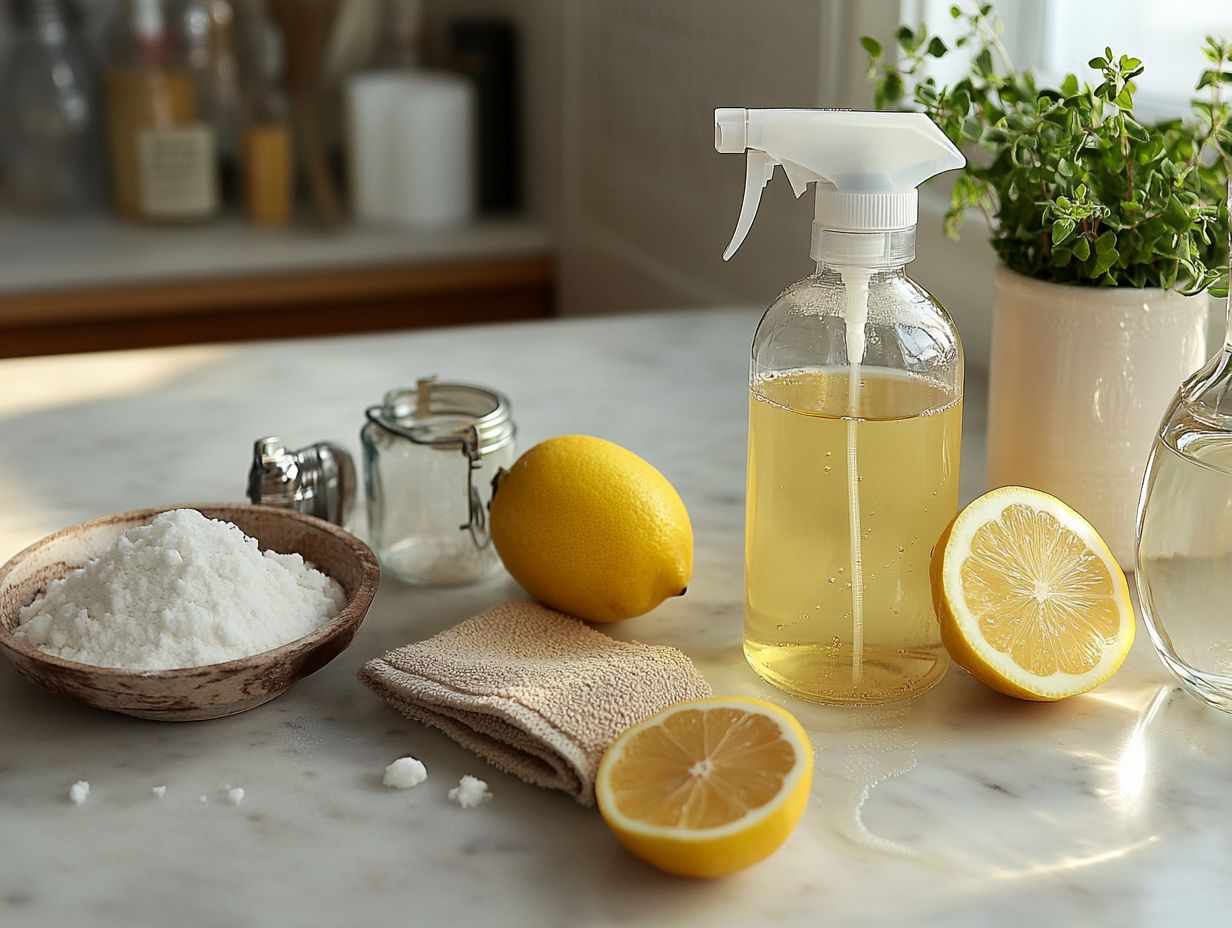
Cornstarch might not be the first thing that comes to mind for cleaning, but it s a remarkable product for tackling grease buildup and wiping down surfaces.
This versatile pantry staple can prove surprisingly effective for a variety of household cleaning tasks. For shiny surfaces like glass, mix cornstarch with water to create a powerful cleaning solution that will leave your windows sparkling and streak-free.
Its abrasive qualities also make it perfect for battling tough grime on appliances, transforming them into gleaming fixtures in your kitchen. Cornstarch is especially useful for tackling grease buildup in various cleaning scenarios.
6. Dish Soap
Dish soap is a staple in your cleaning arsenal. Known for its impressive grease-cutting prowess, it s invaluable for crafting natural cleaning solutions for your kitchen surfaces.
By blending dish soap with other natural ingredients like vinegar, baking soda, or essential oils, you can enhance its cleaning effectiveness while infusing your space with a delightful fragrance. Mixing dish soap with vinegar results in a powerful concoction that effortlessly addresses stubborn stains and odors without resorting to harsh chemicals. Don t wait! Start using dish soap today to maintain a sparkling kitchen.
This method not only upholds the hygiene of your kitchen but also fosters a healthier environment through eco-friendly materials.
Incorporating dish soap into your cleaning routine for countertops and utensils helps thwart the accumulation of grime, ensuring your kitchen remains a hygienic and inviting space for cooking and dining.
How to Use These Natural Ingredients to Tackle Grease?
Utilizing natural ingredients to combat grease offers an environmentally friendly and cost-effective solution. You can craft a kitchen degreaser that is perfectly suited to your needs. From stovetops to oven interiors, these solutions handle it all.
By harnessing the remarkable properties of ingredients such as lemon juice, vinegar, baking soda, and salt, you can effectively eliminate grease buildup on your stove, countertops, and various kitchen surfaces.
These straightforward methods empower you to maintain a pristine kitchen while avoiding harsh commercial cleaners that can harm both your health and the environment. Say goodbye to harmful chemicals and embrace a cleaner, greener home!
1. Lemon Juice and Vinegar Spray
A lemon juice and vinegar spray is a powerful natural cleaner that effortlessly tackles tough grease stains while leaving your kitchen with a refreshing aroma. This lemon-infused solution is perfect for any kitchen surface.
To whip up this effective cleaner, simply combine equal parts of lemon juice and white vinegar in a spray bottle. For an extra boost, consider adding a cup of water and a few drops of dish soap to enhance its grease-fighting ability. If you want added antibacterial properties, mix in a few drops of essential oils. Be sure to shake the mixture well so that all ingredients combine thoroughly.
You can use this versatile spray on all your kitchen surfaces, including countertops, stovetops, and appliances. It s an excellent choice for wiping down cutting boards or revitalizing the sink area, bringing a natural shine to every surface while helping you maintain a clean and inviting environment.
2. Baking Soda and Salt Scrub
Combining baking soda and salt results in an effective scrub that easily eliminates grease buildup from various surfaces in your kitchen. You’ll love how this mixture tackles stubborn, greasy residues that tend to gather on stovetops, countertops, and even inside ovens.
To whip up this scrub, simply mix equal parts of baking soda and salt in a bowl, then add just enough water to create a paste. This delightful concoction provides gentle abrasion for scrubbing and enhances your cleaning efforts with its natural grease-fighting ability.
When applying the scrub, concentrate on areas with heavier grease deposits. Let it sit for a few minutes before wiping it away with a damp cloth. You ll uncover sparkling clean surfaces that gleam with freshness. This method is a must-have in your cleaning routine, perfect for restoring that coveted shine to your kitchen.
3. Cornstarch and Dish Soap Paste
Crafting a paste from cornstarch and dish soap presents a unique approach to tackling stubborn grease spots and rejuvenating the shine of your kitchen surfaces.
This natural cleaner artfully combines the absorbent qualities of cornstarch with the powerful grease-fighting ability of dish soap, proving effective across a range of applications. To create this paste, simply blend equal parts of cornstarch and dish soap until you achieve a smooth consistency.
Once prepared, apply the paste directly to the greasy areas, allowing it to rest for a few minutes to penetrate the grime. With a soft cloth or sponge in hand, gently scrub in circular motions to lift the grease away, then rinse thoroughly with warm water. This technique works wonders on countertops, stovetops, and stainless steel appliances, delivering a sparkling clean without the use of harsh chemicals.
What Are Some Other Tips to Tackle Grease?
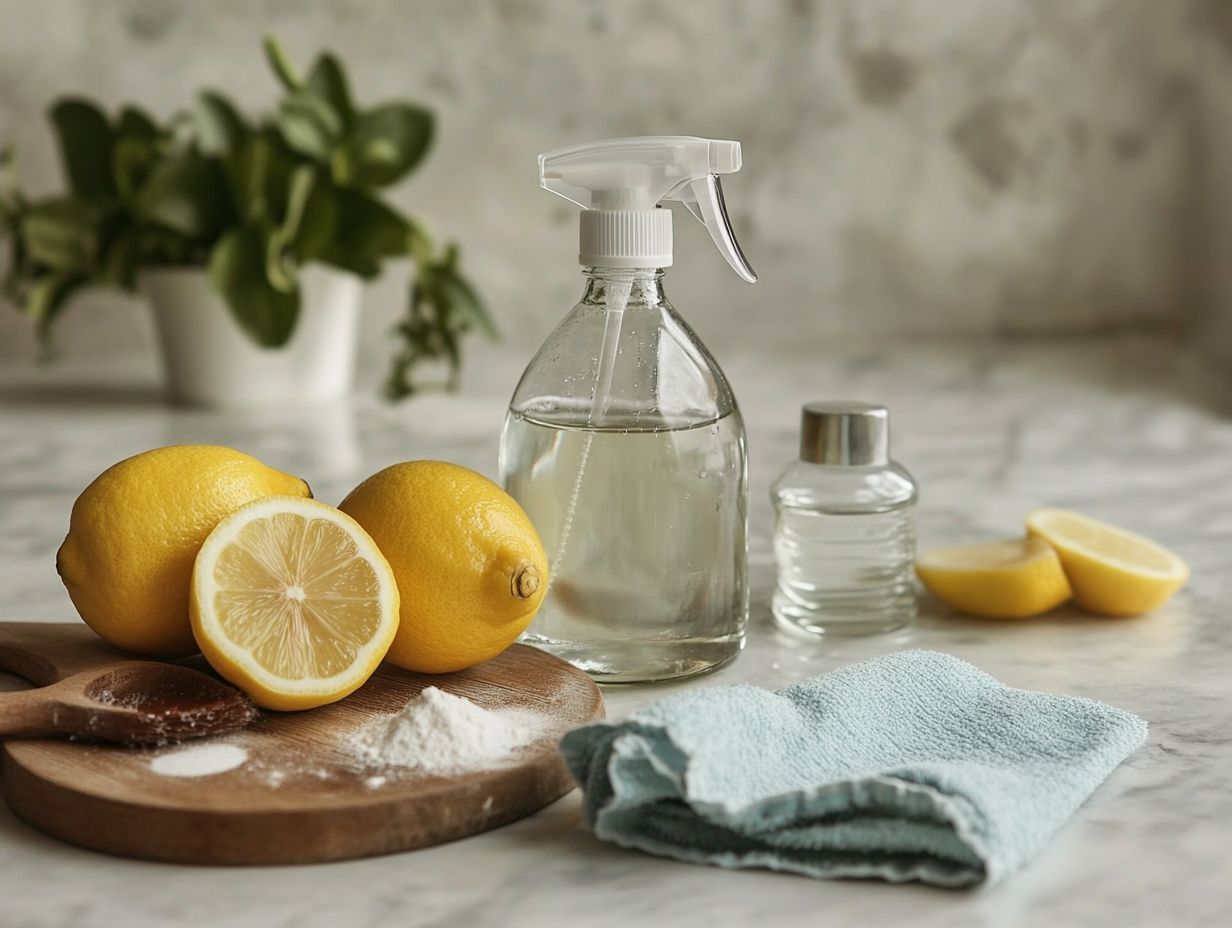
Along with using natural ingredients, you have a wealth of essential maintenance tips at your disposal to effectively combat grease in your kitchen.
Incorporate strategies like using hot water, employing a scrub brush, and allowing your cleaning solutions to sit for a bit before wiping them away. These tactics can significantly boost the effectiveness of your cleaning routine.
With these thoughtful practices, your commitment to maintaining a pristine kitchen will deliver impressive results, all while avoiding the pitfalls of harmful chemicals. Don t wait any longer; try these natural solutions today for a cleaner kitchen!
1. Use Hot Water
Using hot water is one of the most effective strategies for breaking down grease residue and elevating the performance of your cleaning products.
When you apply hot water in various cleaning scenarios, it can transform even the most daunting tasks into manageable challenges. For example, in a kitchen filled with oily pots and pans, introducing hot water during the washing process can significantly loosen that stuck-on grease that has built up over time.
Similarly, as you tackle a dirty stovetop or an oven caked with baked-on residue, hot water works wonders by dissolving layers of residue, making scrubbing feel like a breeze. When dealing with surfaces like countertops or kitchen appliances that tend to attract sticky substances, a quick rinse with hot water can lighten the load, allowing for a more pleasant and efficient cleaning experience.
2. Use A Scrub Brush
Employing a scrub brush is essential when tackling a greasy mess; its bristles are expertly designed to dislodge even the most stubborn grease from your kitchen surfaces.
Selecting the right type of scrub brush for various surfaces can dramatically enhance your cleaning efficiency while safeguarding the integrity of the materials involved. For example, softer bristles work wonders on delicate surfaces like non-stick cookware or countertops, minimizing the risk of scratches. Conversely, if you’re facing tougher surfaces such as stovetops or outdoor grills, you’ll want to reach for firmer bristles.
Utilizing the proper scrubbing technique think circular motions or lighter pressure for fragile items can help you avoid damage while achieving optimal cleanliness. And don t forget: regularly rinsing and changing your brushes is key to maintaining their cleanliness and effectiveness.
3. Let It Sit Before Wiping
Allowing your cleaning solutions to sit before wiping is a straightforward yet highly effective strategy for ensuring that grease residue is thoroughly broken down, making it much easier to clean.
This method operates on the principle of granting the active ingredients in your cleaning agents the necessary time to penetrate and dissolve the grease, which significantly enhances their overall efficacy. Different types of grease may require varying waiting times; for instance, light oil stains might only need about five minutes, whereas heavier, baked-on grease could benefit from a longer resting period of up to twenty minutes.
Choosing the right cleaning product is crucial as well; enzymatic cleaners are excellent at breaking down organic matter, while degreasers are specifically formulated to tackle tougher, stubborn messes. By exercising a bit of patience and adopting a strategic approach, you can achieve spotless surfaces with considerably less effort.
4. Rinse With Cold Water
Rinsing with cold water is often an overlooked step, yet it plays a crucial role in the final stages of your cleaning routine, ensuring that any remaining residues from your cleaning products are thoroughly eliminated.
By utilizing cold water, you not only wash away those residues but also protect your surfaces from potential damage that hot water might cause. Hot water can alter the composition of certain cleaning agents, leading to unintended consequences. Many cleaners are specifically formulated to perform best with cool water, as the lower temperature minimizes reactions that could diminish their effectiveness or leave behind harmful residues.
Rinsing with cold water can significantly enhance the longevity of your cleaned surfaces, preserving their quality and appearance over time. This simple step makes a big difference in maintaining a fresh and inviting environment.
Frequently Asked Questions
How can I effectively tackle grease using natural ingredients?
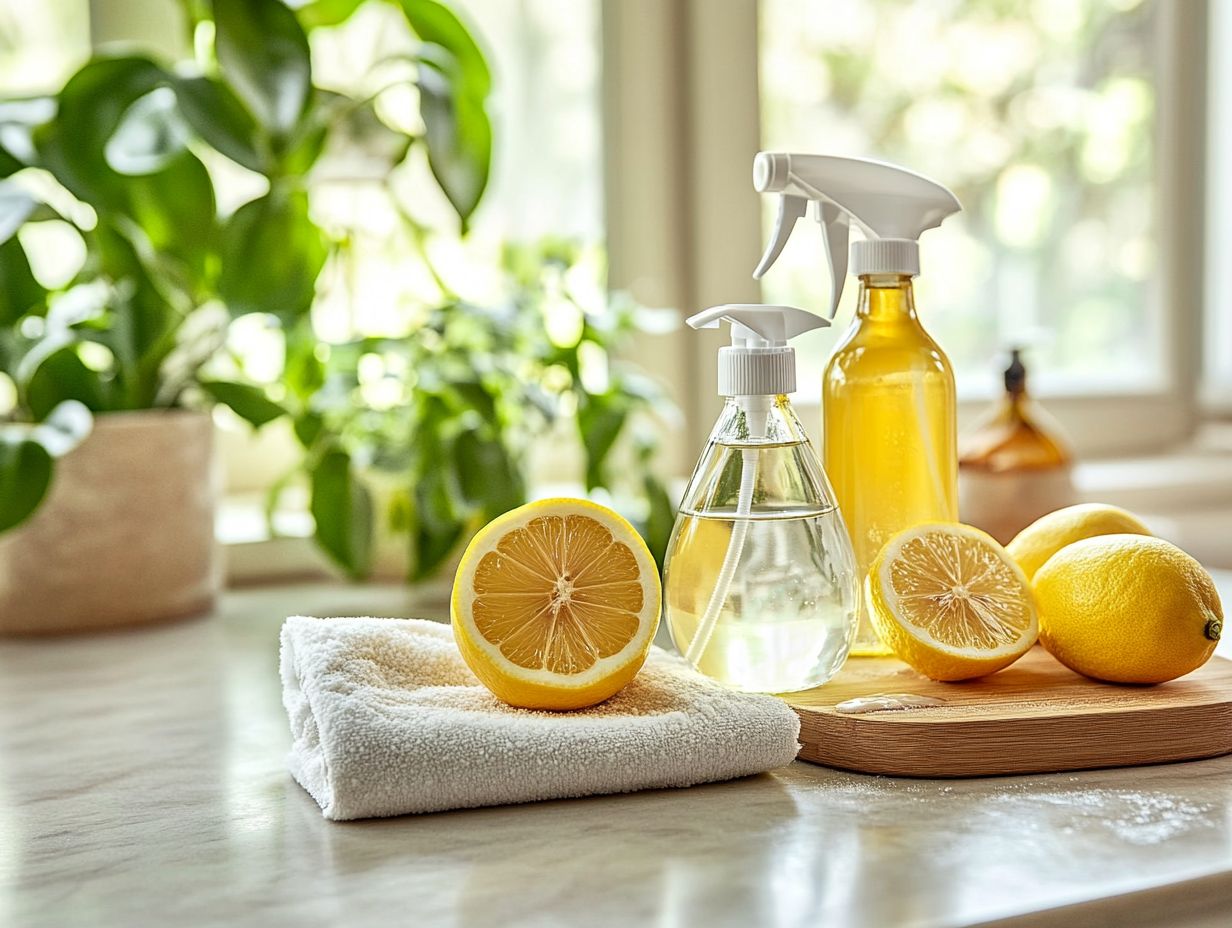
There are several natural ingredients that can help you tackle grease, such as vinegar, baking soda, lemon juice, and dish soap. These ingredients have natural degreasing properties that can effectively remove grease from surfaces.
Can vinegar be used to tackle grease?
Yes, vinegar is a great natural ingredient for tackling grease. Its acidic properties break down grease molecules, making it easier to remove from surfaces. Simply mix equal parts of vinegar and water and use it to clean greasy surfaces.
Try these tips today for a cleaner home!
How does baking soda help in removing grease?
Baking soda is a mild abrasive that helps break down grease and grime. Its basic nature neutralizes acidic grease, making it easier to wipe away.
You can create a paste using baking soda and water. Use it to scrub away stubborn grease!
Is lemon juice effective in tackling grease?
Absolutely! Lemon juice is a fantastic natural degreaser that cuts through grease and leaves surfaces sparkling clean.
Its citric acid breaks down grease molecules, while its fresh scent adds a pleasant aroma.
Can I use dish soap to tackle grease?
Yes, dish soap is a powerful cleaner that effectively removes grease. Its cleaning agents lift grease, making it easy to wipe away.
Mix a few drops of dish soap with warm water for a natural degreaser solution.
Are there any other natural ingredients that can help tackle grease?
Other natural ingredients can also help tackle grease! Salt is a mild abrasive that scrubs away residue.
Cornstarch absorbs excess oil, while essential oils like tea tree and eucalyptus have antibacterial properties that dissolve grease.

